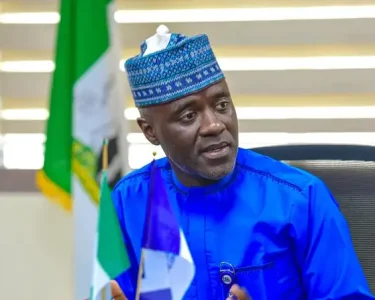The devastating impact of the COVID-19 on the global economy and indeed Nigeria not exempted, has created the impetus for the adoption of eGovernment to tackle critical national development issues.
However, experts and stakeholders at the 2020 Nigeria eGovernment Summit with the theme: COVID-19: Impetus for Accelerated eGovernment Adoption are worried that consistent policy direction and Standardisation are need addressing as the nation moves toward the post COVID-19 era.
Host Governor of the event, the Deputy Governor of Lagos State, Femi Hamzat in his address noted that state government is aware of the essence eGovernment in bringing government services closer to the people.
According to him, as part of its infrastructural support for eGovernment, it has commissioned the deployment 3000 kilometer of metro fibre across the state to easy internet connectivity saying that of the six line of the 3000 kilometer of metro fibre, one is reserved for the state while others are for the private sector.
He said that State Government has also taken the eGovernment project further by working towards ensuring that the large percent of the informal sector of the economy that are cut-off the digital ecosystem are engrafted noting that so many in the informal sector don’t understand the digital divide.
Hamzat disclosed that potentials of technology have been greatly exploited in the state during the COVID-19, stressing that the has helped to deliver services to the people.
While stating that the State has been able to use technology to deploy services to the people, he stated that the State is actively involved in private sector partnership on eGovernment.
Making reference to how eGovernment has impacted governance, the Executive Vice Chairman of the Nigerian Communications Commission, (NCC), Prof. Umar Danbatta said that role the NCC has made it possible for more services like that government coming online.
He said that the eGovernment impact was a 250 million mobile subscriptions as well as a 43.2 % gross domestic product (GDP) contribution by the telecoms sector to the nation’s GDP and an increase in the numbers of internet users.
Beyond the challenges observed by Danbatta, stakeholders also highlighted the impact of policy and standard on effective eGovernment implementation in Nigeria.
One key aspect of such was the poor takeoff of the soft copy of the National Identity Card, although the Minister of Communication and Digital Economy, Dr. Isa Pantami had given direction on that.
It would recalled that already, the soft copy of the national Identity Card was announced to be ready, thereby promptig Nigerians to start downloading it from the PlayStore but National Identity Management Commission, made a u-turn on the directive saying it was no longer ready.
And for months after the Minister gave the directive on immediate use of the soft copy, it was yet to be ready.
Speakers from South Africa, Kenya and Ethiopia attributed the success story of eGovernment in their country to sustained policy and the high level standard in eGovernment deployment.
Isaiah Erhiawarien, Lagos



